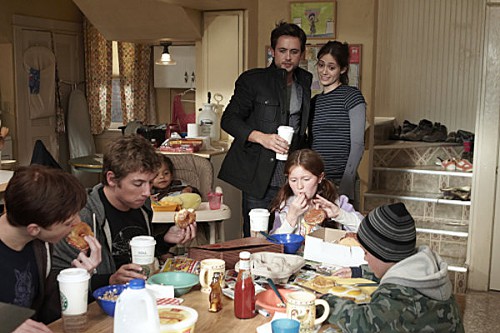What’s the Difference Between Being Broke and Being Poor?


The Nation has an excellent piece by Nona Willis Aronowitz which examines the different ways that two television shows—Shameless and Girls—portray poverty. Aronowitz points out that “we often blur the distinction between the downwardly mobile and the permanent underclass” often to the point where both groups are lumped in together and seen as equal in their struggles. This pervasive fallacy is often employed to demonstrate how universal the hardships are in our post-recession economy, but, much like pretending that those who make $250,000 per year are middle class, it ultimately does nothing but perpetuate the fact that it is almost impossible now to rise out of the economic class in which you’re born.
The economic reality right now is grim for many of us, but there is a huge difference in people who are working minimum wage jobs as some kind of stopgap while they pursue other careers, and people who are working minimum wage jobs with little to no hope of a brighter future. The entitlement that comes with knowing that you have some kind of a safety net—that even if you fall, you won’t go crashing to the ground—is something that everyone deserves to have. Not everyone’s safety net comes in the form of a trust fund or well-off parents, though, which is why it’s so essential to have strong social programs and knowledgeable workers who know their rights.
Aronowitz looks at two different sets of minimum wage workers and compares how they respond to the idea of unionization and fighting for better pay and benefits. She discovered that one group of workers at a sandwich chain in Minnesota who come from relatively privileged backgrounds—the “Occupy Wall Street”-type—have realized that their middle class dreams might not come true. So what did they do? Aronowitz spoke with “a young woman who was galvanized by the realization that her middle-class aspirations may end up being pipe dreams.” She told Aronowitz, “What are the real dreams that we can actually accomplish? Fucking building a union.” In contrast are workers at a Walmart who did “not join the strikes, [and] were terrified about retaliation or just happy to be making money at all.”
The ideal scenario would be for both groups to work together in order to better the lots of the group as a whole, but this kind of utopic vision is historically unlikely. There are many reasons why, but one of them certainly is that few groups choose to ever give up any of their privileges and if the economy improves, and more jobs open up for the over-educated but under-employed, then the issue will quite possibly fade away as quickly as it was seized upon. And the same issues of class stagnation will remain, progress deferred once again.
Follow Kristin Iversen on twitter @kmiversen
You might also like 




















